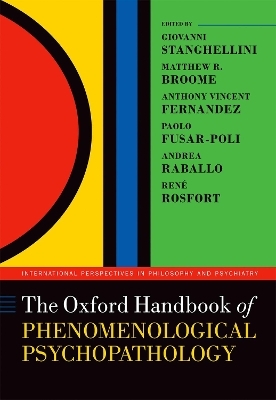
The Oxford Handbook of Phenomenological Psychopathology
Oxford University Press (Verlag)
978-0-19-289592-9 (ISBN)
The field of phenomenological psychopathology (PP) is concerned with exploring and describing the individual experience of those suffering from mental disorders. Whilst there is often an understandable emphasis within psychiatry on diagnosis and treatment, the subjective experience of the individual is frequently overlooked. Yet a patient's own account of how their illness affects their thoughts, values, consciousness, and sense of self, can provide important insights into their condition - insights that can complement the more empirical findings from studies of brain function or behaviour.
The Oxford Handbook of Phenomenological Psychopathology is the first ever comprehensive review of the field. It considers the history of PP, its methodology, key concepts, and includes a section exploring individual experiences within schizophrenia, depression, borderline personality disorder, OCD, and phobia. In addition it includes chapters on some of the leading figures throughout the history of this field.
Bringing together chapters from a global team of leading academics, researchers and practitioners, the book will be valuable for those within the fields of psychiatry, clinical psychology, and philosophy.
Giovanni Stanghellini, MD and Dr. Phil. honoris causa, psychiatrist, is professor of Dynamic Psychology and Psychopathology at "G. d'Annunzio" University (Chieti, Italy), Profesor Adjuncto "D. Portales" University (Santiago, Chile) and chair of the Scuola di Psicoterapia Fenomenologico-Dinamica in Florence. He is one of the leading figures in contemporary philosophy of psychiatry and phenomenological psychopathology. Among his books published by Oxford University Press: Nature and Narrative (with KWM Fulford, K. Morris and JZ Sadler, OUP 2003), Disembodied Spirits and Deanimated Bodies. The Psychopathology of Common Sense (OUP 2004), Emotions and Personhood (with R. Rosfort, OUP 2013), One Ceentury of Karl Jaspers' General Psychopathology (with T. Fuchs, OUP 2013), the Oxford Handbook of Philosophy and Psychiatry (with KWM Fulford et al., OUP 2013) and Lost in dialogue. Anthropology, pychopathology and care (OUP 2016). Matthew Broome is Professor of Psychiatry and Youth Mental Health and Director of the Institute for Mental Health at the University of Birmingham, UK, and Distinguished Research Fellow, Oxford Uehiro Centre for Practical Ethics, University of Oxford, UK. Matthew trained in psychiatry at the Maudsley Hospital, Bethlem Royal Hospital, and the National Hospital for Neurology and Neurosurgery, and has a PhD in Psychiatry from the Institute of Psychiatry, University of London, UK and in Philosophy from the University of Warwick, UK. He is a former chair of the Philosophy Special Interest Group at the Royal College of Psychiatrists, a founder member of the Maudsley Philosophy Group, and is series editor to the Oxford University Press series, International Perspectives in Philosophy and Psychiatry. He is deputy editor for the British Journal of Psychiatry. Anthony Vincent Fernandez received his Ph.D. in philosophy from the University of South Florida in 2016. He is currently an assistant professor of philosophy at Kent State University. His work is on the foundations of applied phenomenology, focusing on the challenges of applying phenomenology to domains that it was not originally designed to study-especially psychopathology. Andrea Raballo MD, Spec. Psych., PhD is Associate Professor of Psychiatry at the University of Perugia, Italy, where he serves as scientific and clinical Head of the Center for Translational, Phenomenological and Developmental Psychopathology. He is currently co-chair of the World Psychiatric Association (WPA) Section for Clinical Psychopathology, and board member of both the European Psychiatric Association (EPA) and the IEPA Early Intervention in Mental Health. His main research interests are phenomenological and developmental psychopathology, with a specific focus on child-adolescent vulnerability and related trajectories towards more severe mental disorders. He is also interested in developing innovative frameworks for service implementation. René Rosfort, born 1975 in Copenhagen, Denmark (PhD, University of Copenhagen, 2008) has studied theology in Copenhagen and philosophy in Florence, Italy. His research deals primarily with ethics, phenomenology, and hermeneutics from the combined perspective of philosophy and psychiatry, and with a particular interest in Kant, Kierkegaard, Ricoeur.
1: Giovanni Stanghellini, Matthew Broome, Anthony Vincent Fernandez, Paolo Fusar Poli, Andrea Raballo, and René Rosfort: Introduction
Section One: History
2: Roberta de Monticelli: Edmund Husserl
3: Angela Ales Bello: The Role of Psychology According to Edith Stein
4: Anthony Vincent Fernandez: Martin Heidegger
5: Anthony Hatzimoysis: Jean-Paul Sartre
6: Maxine Sheets-Johnstone: Merleau-Ponty, Phenomenology, and Psychopathology
7: Shannon M. Mussett: Simone de Beauvoir
8: John Cutting: Max Scheler
9: Andrzej Wiercinski: Hans-Georg Gadamer
10: René Rosfort: Paul Ricoeur
11: Richard A. Cohen: Emmanuel Levinas
12: Federico Leoni: Critiques and Integrations of Phenomenology: Derrida, Foucault, Deleuze
13: Matthias Bormuth: Karl Jaspers
14: Annick Urfer-Parnas: Eugène Minkowski
15: Klaus Hoffmann and Roman Knorr: Ludwig Binswanger
16: Franz Mayr: Medard Boss
17: Thomas Fuchs: Erwin Straus
18: Mario Rossi Monti: Ernst Kretschmer
19: Stefano Micali: Hubertus Tellenbach
20: James Phillips: Kimura Bin
21: Martin Heinze: Wolfgang Blankenburg
22: John Foot: Franco Basaglia
23: Lewis R. Gordon: Frantz Fanon
24: Allan Beveridge: R.D. Laing
Section Two: Foundations and Methods
25: Shaun Gallagher: Phenomenology and cognitive science
26: Massimiliano Aragona: Phenomenology, naturalism and the neurosciences
27: Dermot Moran: The Phenomenological Approach
28: Dorothée Legrand: Clinical Phenomenology: Descriptive, structural and transcendental
29: Louis Sass and Adam Fishman: Introspection, Phenomenology, and Psychopathology
30: René Rosfort: Phenomenology and Hermeneutics
31: Sara Heinämaa and Joona Taipale: Normality
32: Anthony Steinbock: Genetic Phenomenology
33: Anthony Vincent Fernandez and Allan Køster: The Subject Matter of Phenomenological Psychopathology
Section Three: Key-concepts
34: Dan Zahavi: Self
35: René Rosfort: Emotion
36: Roberta Lanfredini: The Unconscious in Phenomenology
37: Joel Krueger: Intentionality
38: René Rosfort: Personhood
39: Francesca Brencio: Befindlichkeit: Disposition
40: KWM (Bill) Fulford and Giovanni Stanghellini: Values and Values-based Practice
41: Eric Matthews: Embodiment
42: Katerina Deligiorgi: Autonomy
43: Søren Overgaard and Mads Gram Henriksen: Alterity
44: Federico Leoni: Time
45: Marcin Moskalewicz: Conscience
46: Christoph Hoerl: Understanding and Explaining
Section Four: Descriptive Psychopathology
47: Femi Oyebode: Consciousness and its Disorders
48: Thomas Fuchs: The Experience of Time and its Disorders
49: Julian C. Hughes: Attention, Concentration, Memory, and their Disorders
50: John Cutting: Thought, Speech and Language Disorders
51: Kevin Aho: Affectivity and its Disorders
52: Josef Parnas and Mads Gram Henriksen: Selfhood and its disorders
53: Maria Inés López-Ibor and Dra Julia Picazo Zapinno: Vital Anxiety
54: Aaron Mishara and Yuliya Zaytseva: Hallucinations and Phenomenal Consciousness
55: John Cutting: Bodily Experience and its Disorders
56: Gabor S. Ungvari: The psychopathological concept of catatonia
57: Giovanni Castellini and Valdo Ricca: Eating behavior and its disorders
58: Matthew Ratcliffe: The Phenomenological Clarification of Grief and its Relevance for Psychiatry
59: Giovanni Castellini and Milena Mancini: Gender Dysphoria
60: Maria Luísa Figueira and Luís Madeira: Hysteria, dissociation, conversion and somatisation
61: Claire Ahern, Daniel B. Fassnacht, and Michael Kyrios: Obsessions and phobias
62: Clara S. Humpston: Thoughts without Thinkers: Agency, Ownership and the Paradox of Thought Insertion
Section Five: Life-worlds
63: Louis Sass: The Life-World of Persons with Schizophrenia (considered as a Disorder of Basic Self)
64: Thomas Fuchs: The Life-World of Persons with Mood Disorders as Disorders of Temporality
65: Martin Bürgy: The Life-World of the Obsessive-Compulsive Person
66: Guilherme Messas, Rafaela Zorzanelli, and Melissa Tamelini: The Life-World of Persons with Hysteria
67: Giovanni Stanghellini and Milena Mancini: The Life-World of persons with borderline personality disorder
68: G. Di Petta: The Life-World of Persons with Drug Addictions
69: Francesco Barale, Davide Broglia, Giulia Zelda De Vidovich, and Stefania Ucelli di Nemi Translated by Martino Rossi Monti: The Life-World of Persons with Autism
Section Six: Clinical Psychopathology
70: Lennart Jansson: First Rank Symptoms of Schizophrenia
71: Arnaldo Ballerini: Schizophrenic Delusion
72: Mads Gram Henriksen and Josef Parnas: Delusional mood
73: Otto Doerr: Delusion and Mood Disorders
74: Paolo Scudellari: Paranoia
75: Matthew Ratcliffe: Auditory Verbal Hallucinations and their Phenomenological Context
76: Andrea Raballo and Lorenzo Pelizza: Affective temperaments
77: Richard Gipps and Sanneke de Haan: Schizophrenic Autism
78: Mario Rossi Monti and Alessandra D'Agostino: Dysphoria in Borderline Persons
79: Luis Madeira, Ilaria Bonoldi, and Barnaby Nelson: Psychosis High Risk states
80: Gareth S. Owen: Psychopathology and Law
81: Cristina Costa, Sergio Carmenates, Luis Madeira, and Giovanni Stanghellini: Atmospheres and the Clinical Encounter
82: Jérôme Englebert: The Psychopathology of Psychopaths
83: Robert D. Stolorow: A Phenomenological-Contextual, Existential, and Ethical Perspective on Emotional Trauma
Section Seven: Phenomenological Psychopathology
84: Georg Northoff: Phenomenological Psychopathology and Neuroscience
85: Massimo Ballerini: Phenomenological Psychopathology and Qualitative Research
86: Julie Nordgaard and Mads Gram Henriksen: Phenomenological Psychopathology and Quantitative Research
87: Giovanni Stanghellini: Phenomenological Psychopathology and Psychotherapy
88: René Rosfort: Phenomenological Psychopathology and Psychiatric Ethics
89: Jake Jackson: Phenomenological Psychopathology and America's Social Life-World
90: Giovanni Stanghellini: Phenomenological Psychopathology and the Formation of Clinicians
91: Anthony Vincent Fernandez: Phenomenological Psychopathology and Psychiatric Classification
92: Eduardo Iacoponi and Harvey Wickham: Phenomenological Psychopathology and Clinical Decision Making
93: Federico Leoni: Phenomenological Psychopathology and Psychoanalysis
94: Anna Bortolan: Phenomenological Psychopathology and Autobiography
95: Grant Gillett and Patrick Seniuk: Phenomenological Psychopathology, Neuroscience, Psychiatric Disorders and the Intentional Arc
96: Marco O. Bertelli, Johan De Groef, and Elisa Rondini: The phenomenology of Neurodiversity
97: Francesca Ferri and Vittorio Gallese: The Bodily Self in Schizophrenia: From Phenomenology to Neuroscience
| Erscheinungsdatum | 08.04.2021 |
|---|---|
| Verlagsort | Oxford |
| Sprache | englisch |
| Maße | 170 x 245 mm |
| Gewicht | 1822 g |
| Themenwelt | Geisteswissenschaften ► Philosophie ► Philosophie der Neuzeit |
| Medizin / Pharmazie ► Medizinische Fachgebiete ► Psychiatrie / Psychotherapie | |
| ISBN-10 | 0-19-289592-3 / 0192895923 |
| ISBN-13 | 978-0-19-289592-9 / 9780192895929 |
| Zustand | Neuware |
| Informationen gemäß Produktsicherheitsverordnung (GPSR) | |
| Haben Sie eine Frage zum Produkt? |
aus dem Bereich


